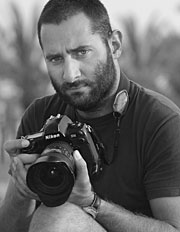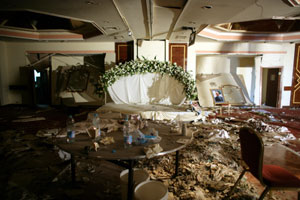 |
 | ||||||||||
To Die at Your Children's Wedding
|
 |
|||||||||
|
Wednesday, Nov. 9: Four Iraqi suicide bombers - three men and a woman connected with the Jordanian Abu Musab al-Zarqawi, the Al-Qaida leader in Iraq - walked into three different western hotels in Amman, Jordan, wearing belts packed with explosives and steel balls and blew themselves up, killing 59 people and wounding hundreds of others. In one of the three hotels, the SAS Radisson, a bride and a groom, Nadia Alami and Ashraf al-Akhras, were celebrating their wedding with hundreds of guests.
The bride and groom, Nadia and Ashraf, survived the explosion, but Ashraf lost his father and 16 of his father's relatives while Nadia lost her father, mother and nine members of his family. The mother of the bride died of her wounds nine days following the attack, bringing the number of people killed by the bombers to 59.
The two Iraqi bombers at the SAS Radisson, where the majority of the deaths from the three attacks occurred - almost 30 people in all - were husband and wife Ali Hussein Ali al-Shamari and Sajida Mubarak Atrous al-Rishawi. The explosive belt on Sajida failed to go off due to a malfunction and she left the hotel as her husband was blowing himself up. After being arrested, she confessed her desire for death on Jordanian television.
"On Nov. 5th, I accompanied my husband to Jordan with a forged Iraqi passport, under the name of Ali Hussein Ali and Sajida Abdel Qader Latif. ... He had two explosive belts. He put one on me and wore the other. He taught me how to use it, how to pull the (primer cord) and operate it. ... We rented a car and entered the hotel on Nov. 9th. My husband and I went inside the hotel; he went to one corner and I went to another. There was a wedding at the hotel with children, women and men inside. My husband detonated (his bomb), I tried to explode (my belt) but it wouldn't. I left; people fled running and I left running with them."
It is hard to get over the detached manner with which Sajida tells how she went to the wedding reception and saw there were women and children in attendance. Her voice bore no emotion, no hint of regret in her confession. I was left wondering how human beings can reduce themselves to this level. How much hate can they be carrying inside them to commit this type of act? Jordan's King Abdullah, after watching the confession on television, had this to say about the woman: "Insane."
At the same time, I went to pay a visit to the family of the groom, in the tent near their home, where he and the surviving relatives exchanged condolences. I spent a few hours with them and was struck by the dignity with which they handled their pain, as well as by the fact that certain recollections came from their lips as if the events had been experienced by someone else.
As he told me all this, I was taking pictures of him. It was not easy, and I had the distinct feeling of violating his privacy. I had experienced the same feeling the day after the attack, when I went to the various hospitals to photograph the survivors, some of whom were in critical condition. It was painful to approach the families, trying to be as discreet as possible, and ask them, while they stood vigil at the deathbeds of their loved ones, "Good day. Would you mind if I took some photographs?"
There are times when I feel like a jackal feeding on the pain of others. Yet it is my hope that, by telling the stories of people who, quite often, might otherwise never be heard from, my work can serve as a lesson, heightening the awareness of those sitting comfortably in their chairs throughout the rest of the world, reading their newspapers.
And we can ask ourselves the reason for all this, how things could have gotten so far out of hand? How it is possible for our society and our way of life to produce people such as the husband and wife team of Ali Hussein Ali al-Shamira and Sajida Mubarak Atrous al-Rishawi, who voluntary deprived themselves of the most precious gift of all - life - in order to blow up not only themselves but dozens of innocent wedding guests, including women and children?
© Marco Di Lauro
Dispatches are brought to you by Canon. Send Canon a message of thanks. |
||||||||||
Back to December 2005 Contents
|
|



